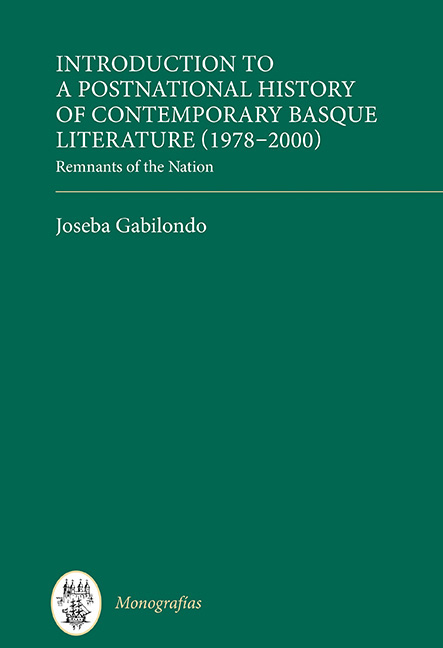 Introduction to a Postnational History of Contemporary Basque Literature (1978–2000)
Introduction to a Postnational History of Contemporary Basque Literature (1978–2000) Book contents
- Frontmatter
- Contents
- Preface and Notes on the Translation
- Acknowledgements
- I Postnational Theory and History
- II Writing the Nation: On Atxaga's Ethiopia and Obabakoak (1978-92)
- III After the Nation: Hybrid Postnational Literatures (1992-2000)
- 7 Before Babel: Globalization, Ethnic Hybridity, and Enjoyment
- 8 Terrorism as Memory: Historical Novels and Masochist Masculinity
- 9 Maternal Exile: Women Writers, Cultural Politics, and Individual Utopia
- 10 Melancholic Migrancy: Writing a Postnational Lesbian Self
- 11 Nationalist Crisis: Women's Literature and Neoliberalism
- Epilogue: Basque Literatures 2001-17
- Works Cited
- Index
10 - Melancholic Migrancy: Writing a Postnational Lesbian Self
from III - After the Nation: Hybrid Postnational Literatures (1992-2000)
Published online by Cambridge University Press: 06 September 2019
- Frontmatter
- Contents
- Preface and Notes on the Translation
- Acknowledgements
- I Postnational Theory and History
- II Writing the Nation: On Atxaga's Ethiopia and Obabakoak (1978-92)
- III After the Nation: Hybrid Postnational Literatures (1992-2000)
- 7 Before Babel: Globalization, Ethnic Hybridity, and Enjoyment
- 8 Terrorism as Memory: Historical Novels and Masochist Masculinity
- 9 Maternal Exile: Women Writers, Cultural Politics, and Individual Utopia
- 10 Melancholic Migrancy: Writing a Postnational Lesbian Self
- 11 Nationalist Crisis: Women's Literature and Neoliberalism
- Epilogue: Basque Literatures 2001-17
- Works Cited
- Index
Summary
I remember I met Itxaro Borda back in 1995 at Galeuzka, the annual meeting of national minority writers of Southwest Europe, particularly from the Basque, Galician, and Catalonian nations, which span over the Spanish and French states, as well as Andorra and other national diasporas located mainly in the Americas. That year Galeuzka took place in A Corunha, Galicia. What struck me most about Borda was her inclination to mingle with the Galicians, rather than ‘her own people’, that is, the Basques. She seemed to be at home among the Galicians rather than the Basques. But then, how can one feel at home among ‘strangers’ when home is so precarious in the first place? I think I understood this intuitively because I no longer lived among ‘my own people’ either. I was then one of the few, if not the only Basque speaker in Philadelphia, the city in which I lived at that time. Although, unlike me, Borda was only temporarily out of the Basque Country, it takes one migrant or exiled subject to know another. A few days later I returned to Philadelphia and she went back home to Baiona, a city in the French Basque Country. The sense, however, that she was a ‘migrant at home’ stayed with me.
Nowadays there are countless volumes of literature on migrancy and exile, but from the standpoint of global migrancy, little has been written about ‘not being home at home’ – if one disregards the old psychoanalytic, existentialist, and Marxist clichés of ‘alienation and estrangement’, of which Kristeva's Strangers to Ourselves is one of the latest updates. This is perhaps another reason why, for a moment at Galeuzka, I intuitively thought there was something radical about Borda's migrancy, one in which you do not leave home.
Here I intend to examine Borda's radical migrancy, as I intuitively perceived it from my own exilic encounter with her back in 1995. I want to argue that Borda's radical migrancy is ‘melancholic’. Following Freud's distinction between mourning and melancholia, I have coined the term ‘melancholic migrancy’ in order to refer to a form of migrancy that has permanently lost its ‘original home’, but needs this loss in order to define its location, identity, and desire. This is why ‘melancholic migrancy’ needs to be at home: only at home can the loss be felt, desired, and identified.
- Type
- Chapter
- Information
- Introduction to a Postnational History of Contemporary Basque Literature (1978–2000)Remnants of the Nation, pp. 241 - 268Publisher: Boydell & BrewerPrint publication year: 2019


